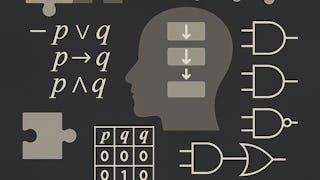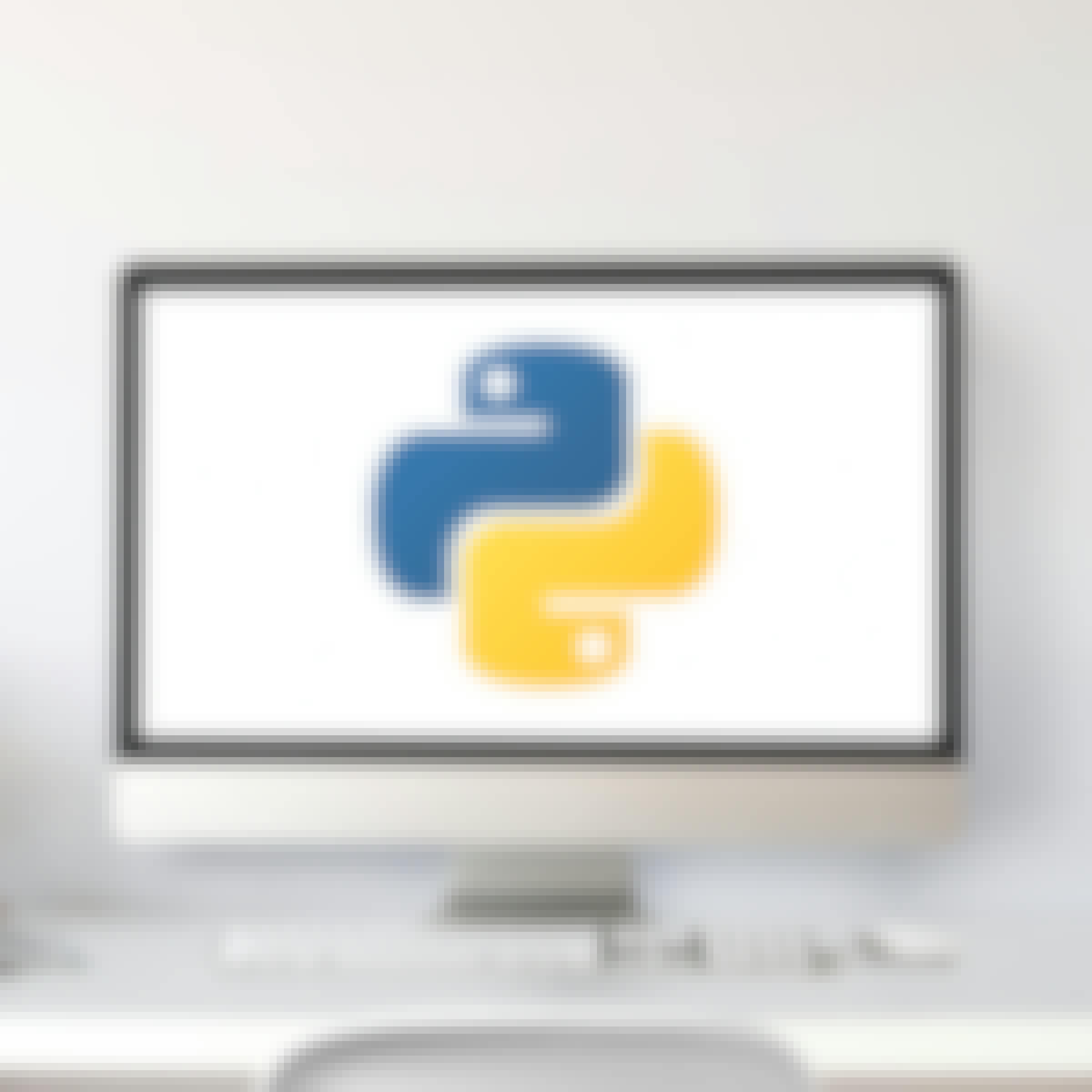- Browse
- Logic
Results for "logic"
 Status: Free TrialFree TrialD
Status: Free TrialFree TrialDDuke University
Skills you'll gain: Deductive Reasoning, Critical Thinking, Logical Reasoning, Analysis, Diagram Design, Probability, Sampling (Statistics), Persuasive Communication, Research, Sample Size Determination, Writing, Case Studies, Oral Expression, Correlation Analysis, Communication, Scientific Methods, Information Architecture, Business Communication, Interactive Learning
4.6·Rating, 4.6 out of 5 stars3.7K reviewsBeginner · Specialization · 3 - 6 Months
 Status: PreviewPreviewS
Status: PreviewPreviewSStanford University
Skills you'll gain: Logical Reasoning, Computational Logic, Deductive Reasoning, Computational Thinking, Problem Solving, Business Logic, Complex Problem Solving, Decision Making
4.4·Rating, 4.4 out of 5 stars655 reviewsIntermediate · Course · 1 - 3 Months
 Status: NewNewStatus: Free TrialFree TrialU
Status: NewNewStatus: Free TrialFree TrialUUniversity of London
Skills you'll gain: Computational Logic, Logical Reasoning, Deductive Reasoning, Theoretical Computer Science, Computer Science, Critical Thinking, Computational Thinking, Business Logic, Algorithms, Mathematical Modeling, Problem Solving, Strategic Communication
Intermediate · Course · 1 - 4 Weeks
 Status: NewNewA
Status: NewNewAAlex Genadinik
Skills you'll gain: Deductive Reasoning, Logical Reasoning, Case Studies, Ethical Standards And Conduct, Psychology
Mixed · Course · 1 - 4 Weeks
 Status: PreviewPreviewS
Status: PreviewPreviewSStanford University
Skills you'll gain: Mathematical Theory & Analysis, Mathematics and Mathematical Modeling, Calculus, Deductive Reasoning, Logical Reasoning
4.8·Rating, 4.8 out of 5 stars3K reviewsIntermediate · Course · 1 - 3 Months
 Status: Free TrialFree TrialD
Status: Free TrialFree TrialDDuke University
Skills you'll gain: Persuasive Communication, Research, Writing, Oral Expression
4.6·Rating, 4.6 out of 5 stars3.1K reviewsBeginner · Course · 1 - 3 Months
What brings you to Coursera today?
 Status: Free TrialFree TrialJ
Status: Free TrialFree TrialJJohns Hopkins University
Skills you'll gain: Algebra, Mathematical Modeling, Graphing, Arithmetic, Advanced Mathematics, Applied Mathematics, General Mathematics, Analytical Skills, Probability & Statistics, Geometry
4.8·Rating, 4.8 out of 5 stars805 reviewsBeginner · Specialization · 3 - 6 Months
 Status: Free TrialFree Trial
Status: Free TrialFree TrialSkills you'll gain: Data Import/Export, Programming Principles, Web Scraping, File I/O, Python Programming, Jupyter, Data Structures, Pandas (Python Package), Data Manipulation, JSON, Computer Programming, Restful API, NumPy, Object Oriented Programming (OOP), Application Programming Interface (API), Automation, Data Analysis
4.6·Rating, 4.6 out of 5 stars43K reviewsBeginner · Course · 1 - 3 Months
 Status: NewNewStatus: Free TrialFree TrialB
Status: NewNewStatus: Free TrialFree TrialBBirla Institute of Technology & Science, Pilani
Skills you'll gain: Data Analysis, Computational Logic, Engineering Calculations, Trigonometry, Linear Algebra, Engineering Analysis, Logical Reasoning, Deductive Reasoning, Probability & Statistics, Statistical Analysis, Calculus, Analytical Skills, Bayesian Statistics, Differential Equations, Programming Principles, Statistical Inference, Theoretical Computer Science, Numerical Analysis, Descriptive Analytics, Applied Mathematics
4.6·Rating, 4.6 out of 5 stars191 reviewsBeginner · Specialization · 3 - 6 Months
 Status: PreviewPreviewU
Status: PreviewPreviewUUniversity of Leeds
Skills you'll gain: Logical Reasoning, Computational Logic, Computational Thinking, Algorithms, Theoretical Computer Science, Artificial Intelligence, Cryptography, Graph Theory
4.6·Rating, 4.6 out of 5 stars32 reviewsBeginner · Course · 1 - 4 Weeks
 Status: Free TrialFree TrialD
Status: Free TrialFree TrialDDeep Teaching Solutions
Skills you'll gain: Deductive Reasoning, Logical Reasoning, Critical Thinking, Cognitive flexibility, Problem Solving, Analytical Skills, Case Studies, Creative Thinking, Innovation, Decision Making, Persuasive Communication, Verbal Communication Skills
4.8·Rating, 4.8 out of 5 stars39 reviewsBeginner · Course · 1 - 4 Weeks
 Status: PreviewPreviewU
Status: PreviewPreviewUUniversity of Amsterdam
Skills you'll gain: Computational Logic, Logical Reasoning, Deductive Reasoning, General Mathematics
4.4·Rating, 4.4 out of 5 stars300 reviewsAdvanced · Course · 1 - 3 Months
In summary, here are 10 of our most popular logic courses
- Introduction to Logic and Critical Thinking: Duke University
- Introduction to Logic: Stanford University
- Logic and Reasoning for Computing: University of London
- Logic In Philosophy: Logical Fallacies And Common Mistakes: Alex Genadinik
- Introduction to Mathematical Thinking: Stanford University
- Think Again I: How to Understand Arguments: Duke University
- Algebra: Elementary to Advanced: Johns Hopkins University
- Python for Data Science, AI & Development: IBM
- Mathematics for Engineering: Birla Institute of Technology & Science, Pilani
- An Introduction to Logic for Computer Science: University of Leeds
Frequently Asked Questions about Logic
Logic is the systematic study of valid reasoning and argumentation. It is essential because it helps individuals make sound decisions, analyze arguments critically, and solve problems effectively. In various fields, from philosophy to computer science, logic serves as a foundational tool for understanding complex concepts and developing clear, rational thought processes. By mastering logic, you can improve your analytical skills, which are invaluable in both personal and professional contexts.
A background in logic can open doors to various career paths. Jobs that benefit from strong logical reasoning skills include roles in data analysis, software development, law, academia, and research. Positions such as data scientist, software engineer, and legal analyst often require the ability to think critically and solve problems efficiently. Additionally, logic is crucial in fields like economics and philosophy, where clear reasoning is paramount.
Some of the best online logic courses include the Introduction to Logic and Critical Thinking Specialization and An Introduction to Logic for Computer Science. These courses provide a solid foundation in logical principles and critical thinking skills, making them suitable for beginners and those looking to enhance their reasoning capabilities.
Yes. You can start learning logic on Coursera for free in two ways:
- Preview the first module of many logic courses at no cost. This includes video lessons, readings, graded assignments, and Coursera Coach (where available).
- Start a 7-day free trial for Specializations or Coursera Plus. This gives you full access to all course content across eligible programs within the timeframe of your trial.
If you want to keep learning, earn a certificate in logic, or unlock full course access after the preview or trial, you can upgrade or apply for financial aid.
To learn logic, start by exploring foundational concepts through online courses or textbooks. Engage with exercises that challenge your reasoning skills, such as puzzles or logic games. Practice constructing arguments and identifying logical fallacies in everyday discussions. Additionally, consider joining study groups or forums where you can discuss logical concepts with others, enhancing your understanding through collaboration.
Typical topics covered in logic courses include propositional logic, predicate logic, logical fallacies, argument structure, and critical thinking techniques. Some courses may also explore applications of logic in computer science, such as algorithms and programming logic. By studying these topics, you can develop a comprehensive understanding of how logic functions in various contexts.
For training and upskilling employees, courses like the Critical Thinking & Logic: Real-World Skills can be particularly beneficial. These courses focus on practical applications of logic in the workplace, helping employees enhance their problem-solving and decision-making skills. Additionally, courses that integrate logic with specific fields, such as Logic for Economists, can provide targeted training that aligns with organizational goals.










